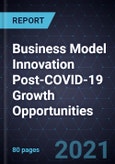Product Experience, Interactive Engagement, and Personalization to Shape Unified Experiences in Customer-based Models
As the post-COVID-19 scenario looms, traditional business models are undergoing rapid changes, and the need to innovate and expand the business model portfolio becomes essential to enable enterprise survival and growth. Multiple trends are driving the need for business model innovation, such as supply chains undergoing pandemic-induced transformation, increasing environment-consciousness brought on by climate change, the role of data across functions, and the shift from a product to a service model.
Rapid innovation in business models featuring technological convergence will be the norm to sustain growth in a hypercompetitive world, while a lack of innovation can make businesses obsolete. Value will shift from today’s product-centric model to consumer-centric data, systems, and services in the new competitive ecosystem.
Companies have begun serving customers to ensure stickiness and longevity instead of focusing mostly on product-based transactions. The emergence of the as-a-service model for critical elements of a business, such as Data-as-a-Service (DaaS), simplifies product access with flexible payment options.
Post COVID-19, consumers will expect more tech-convergent experiences with single interfaces and platforms that unify their journey. Product experience, interactive engagement, and personalization will shape unified experiences end users in customer-based models.
Crowd-based business models that leverage the potential of crowd thinking, crowd capability, and crowd behaviors will create markets and uncover needs in a changing environment. Crowd-based models utilize the power of the collective, making this an essential category.
Socially aware and environmentally responsible companies have taken the initiative in the adoption of circular-centric models. A growing consciousness of the environment and sustainability among end consumers has driven mainstream companies to explore circular economy-based models.
Organizations must strategize to capture growth opportunities by adopting suitable business models to achieve measurable impacts, such as revenue growth, valuation growth, new markets growth, and new customer segment growth. Adjacent and new business models will outpace traditional businesses over time. Tomorrow’s successful companies must build a portfolio of initiatives across core, adjacent, and new opportunities that supports revenue growth.
Table of Contents
Trends Strategic Imperative
- Why Is Growth Becoming Increasingly Difficult To Achieve?
- The Strategic Imperative 8™
- Our Mega Trend Universe-Overview
- Growth Opportunities Fuel the Growth Pipeline Engine™
Executive Dashboard
- Our Mega-Trend Universe - New Business Models
- Key Findings
- Growth Opportunities Critical to Future Success
- Business Models Overview
- Business Models Introduction
- Shareholder Value Driven by Business Models
- What is the Impact of BMI?
- Key Trends and Enablers of BMI
- Scope and Coverage of Business Models
- Overview of BMI Coverage
- BMI Mapping Framework-Scoring Index
Customer-based Models
- Exemplary Customer-based Business Models
- Business Model 1 - Virtual Experience Economy
- Business Model 2 - Pop-ups
- Business Model 3 - Direct to Consumer
- Business Model 4 - Personalization
- Business Model 5 - Hyperlocalization
- Business Model 6 - Outcome-based Model
- Business Model 7 - Flexible Payment Models
- Exemplary Crowd-based Business Models
- Business Model 1 - Co-creation
- Business Model 2 - Community Group Buying
- Business Model 3 - Access Democratization
- Business Model 4 - Identity Broadcasting
- Business Model 5 - Micro Jobbing
- Business Model 6 - Livestreaming Ecommerce
- Exemplary As-a-service Business Models
- Business Model 1 - Product-as-a-service
- Business Model 2 - BPaaS
- Business Model 3 - Paas
- Business Model 4 - Aaas
- Business Model 5 - Daas
- Exemplary Ecosystem-based Business Models
- Business Model 1 - Sharing Economy
- Business Model 2 - Vertical Integration
- Business Model 3 - Network Orchestrator
- Business Model 4 - PMP
- Business Model 5 - Decentralized Ownerless Business
- Exemplary Circular Economy Business Models
- Business Model 1 - Shared Remanufacturing Platforms
- Business Model 2 - Secondary Marketplaces
- Business Model 3 - Reverse Logistics
- Business Model 4 - Dematerialization
- Business Model 5 - Carbon Trading
- BMI Mapping Framework
Growth Opportunities Universe
- Growth Opportunity Levers
- Growth Opportunity 1 - Convergence of Technology and Travel Could Initiate a Virtual-trip-within-travel Business Model
- Growth Opportunity 2 - Sustainability-driven Coopetition Based Business Model
- Growth Opportunity 3 - Outcome-as-a-service Model Drives Value Chain Compression and Transforms Customer to a Partner for OEMs
- Critical Success Factors for Growth
- Assessment-The Way Forward
- Next Steps
- Identifying Your Company’s Growth Zone
- Your Next Steps
- List of Exhibits
- Legal Disclaimer
Appendix
- Our Mega-Trend Universe








